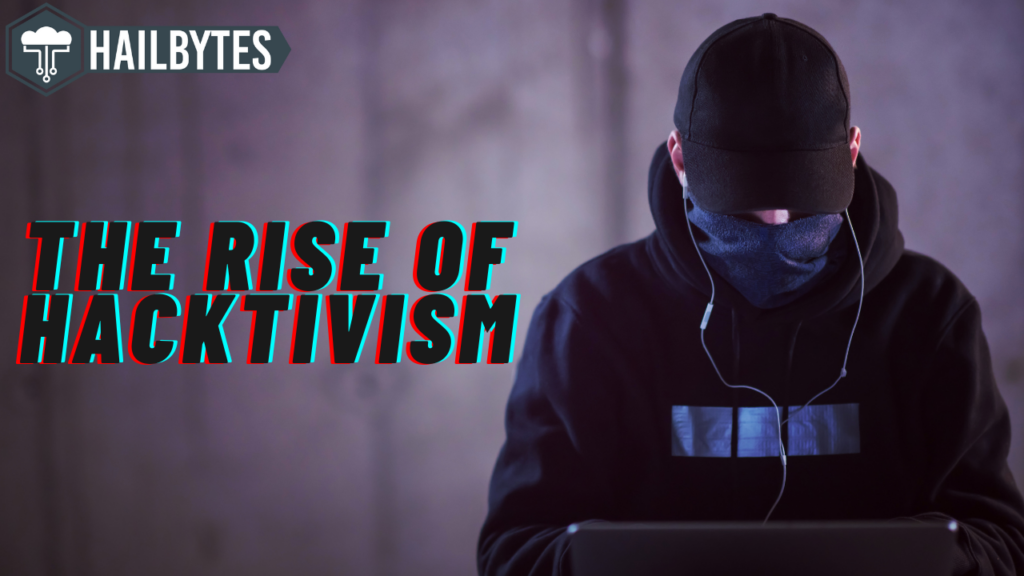The Rise Of Hacktivism | What Are The Effects On Cybersecurity?

Introduction
With the rise of the internet, society has gained a new form of activism – hacktivism. Hacktivism is the use of technology to promote a political or social agenda. While some hacktivists act in support of specific causes, others engage in cybervandalism, which is the use of hacking to deliberately damage or disrupt computer systems.
The Anonymous group is one of the most well-known hacktivist groups. They have been involved in numerous high-profile campaigns, such as Operation Payback (a response to anti-piracy efforts) and Operation Aurora (a campaign against Chinese government cyber-espionage).
While hacktivism can be used for good, it can also have negative consequences. For example, some hacktivist groups have attacked critical infrastructure, such as power plants and water treatment facilities. This can pose a serious threat to public safety. In addition, cybervandalism can cause economic damage and disrupt essential services.
The rise of hacktivism has led to increased concerns about cybersecurity. Many organizations are now investing in security measures to protect their systems from attack. However, it is difficult to completely defend against determined and skilled hackers. As long as there are people who are willing to use their skills for political or social agendas, hacktivism will remain a threat to cybersecurity.
Examples Of Hacktivism In Recent Years
2016 U.S. Presidential Election
During the 2016 U.S. presidential election, several hacktivist groups attacked the campaign websites of both candidates – Hillary Clinton and Donald Trump. The Clinton campaign website was hit with a distributed denial of service (DDoS) attack, which overwhelmed the server with traffic and caused it to crash. The Trump campaign website was also hit with a DDoS attack, but it was able to stay online thanks to its use of Cloudflare, a service that protects against such attacks.
2017 French Presidential Election
During the 2017 French presidential election, several candidates’ campaign websites were hit with DDoS attacks. The candidates targeted included Emmanuel Macron (who ultimately won the election), Marine Le Pen, and Francois Fillon. In addition, a fake email claiming to be from Macron’s campaign was sent to journalists. The email claimed that Macron had used an offshore account to avoid paying taxes. However, the email was later revealed to be fake and it is unclear who was behind the attack.
WannaCry Ransomware Attack
In May of 2017, a piece of ransomware known as WannaCry began spreading across the internet. The ransomware encrypted files on infected computers and demanded a ransom in order to decrypt them. WannaCry was particularly damaging because it used a vulnerability in Microsoft Windows to spread quickly and infect a large number of computers.
The WannaCry attack affected over 200,000 computers in 150 countries. It caused billions of dollars in damage and disrupted essential services, such as hospitals and transportation. While the attack appeared to be primarily motivated by financial gain, some experts believe that it may have also been politically motivated. For example, North Korea has been accused of being behind the attack, although they have denied any involvement.
Possible Motivations For Hacktivism
There are many possible motivations for hacktivism, as different groups have different goals and agendas. Some hacktivist groups may be motivated by political beliefs, while others may be motivated by social causes. Here are some examples of possible motivations for hacktivism:
Political Beliefs
Some hacktivist groups carry out attacks in order to further their political agenda. For example, the group Anonymous has attacked various government websites in protest of government policies that they disagree with. They have also carried out attacks against companies that they believe are harming the environment or engaging in unethical practices.
Social Causes
Other hacktivist groups focus on social causes, such as animal rights or human rights. For example, the group LulzSec has attacked websites that they believe are involved in animal testing. They have also attacked websites that they believe are censoring the internet or engaging in other activities that violate freedom of speech
Economic Gain
Some hacktivist groups may be motivated by economic gain, although this is less common than other motivations. For example, the group Anonymous has attacked PayPal and MasterCard in protest of their decision to stop processing donations to WikiLeaks. However, most hacktivist groups do not appear to be motivated by financial gain.
What Are The Effects Of Hacktivism On Cybersecurity?
Hacktivism can have a number of effects on cybersecurity. Here are some examples of how hacktivism can affect cybersecurity:
Increased Awareness Of Cybersecurity Threats
One of the most significant effects of hacktivism is that it raises awareness of cybersecurity threats. Hacktivist groups often target high-profile websites and organizations, which can bring attention to the vulnerabilities that they exploit. This increased awareness can lead to improved security measures, as organizations become more aware of the need to protect their networks.
Increased Security Costs
Another effect of hacktivism is that it can increase security costs. Organizations may need to invest in additional security measures, such as intrusion detection systems or firewalls. They may also need to hire more staff to monitor their networks for signs of attack. These increased costs can be a burden for organizations, especially small businesses.
Disruption Of Essential Services
Another effect of hacktivism is that it can disrupt essential services. For example, the WannaCry attack disrupted hospitals and transportation systems. This disruption can cause a great deal of inconvenience and even danger for the people who rely on these services.
As you can see, hacktivism can have a variety of effects on cybersecurity. While some of these effects are positive, such as increased awareness of cybersecurity threats, others are negative, such as increased security costs or disruptions of essential services. Overall, the effects of hacktivism on cybersecurity are complex and difficult to predict.







